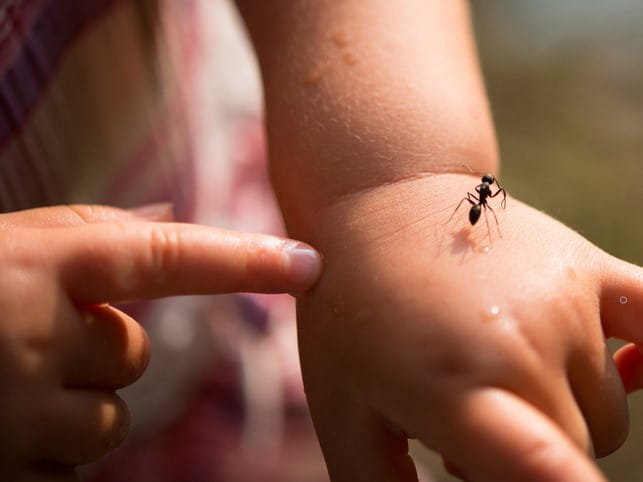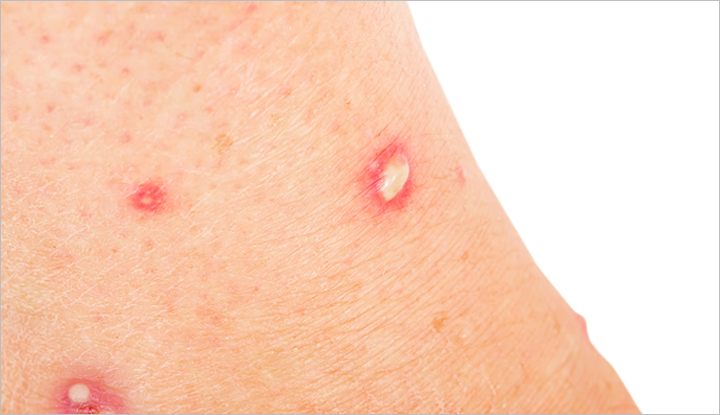Ant bites swell due to the body’s immune response to their venom, typically causing inflammation and itching. This reaction helps isolate the venom from spreading to other parts of the body.
Ant bites are a common nuisance, especially during warm weather when ants are more active. The discomfort we experience from an ant bite is the result of our body’s defense system kicking into gear. Many types of ants inject formic acid into their victim, prompting a localized reaction.
Our immune cells rush to the affected area to combat the foreign substance, leading to redness, swelling, and sometimes hives or blisters. While the swelling is a sign that our bodies are working to heal, it can be quite uncomfortable. Taking the necessary steps to care for an ant bite quickly can reduce the severity of these symptoms and promote faster healing.
Anatomy Of An Ant Bite
An ant bite may seem simple, but it’s a complex reaction. Behind the tiny nip is biology working at a micro level. Let’s unzip this tiny, yet significant, defense event.
The Ant’s Defense Mechanism
Ants bite to defend their territory. Once they bite, they inject formic acid. This causes a burning sensation and leads to swelling.
Components Of An Ant’s Venom
Ant venom contains chemicals which cause our immune system to react. Here’s a breakdown:
- Formic acid: Causes pain and irritation.
- Proteins: Trigger swelling and redness.
- Alkaloids: Affect skin and muscle tissues.
| Component | Effect on Skin |
|---|---|
| Formic Acid | Pain and Irritation |
| Proteins | Swelling and Redness |
| Alkaloids | Tissue Affectation |
Impact On Human Skin
The impact of ant bites on human skin can sometimes be more than a mere annoyance. For those who have experienced it, an ant bite introduces a cocktail of chemicals into the skin. This process often leads to a range of reactions.
Immediate Reaction To An Ant Bite
The immediate reaction to an ant bite can vary greatly from person to person. The area around the bite often turns red. It can sometimes produce a sharp, burning pain or a dull ache. For many, a raised bump appears within seconds. In some cases, the body’s defense mechanisms kick in, flooding the bite site with histamines. This is the body’s way of trying to neutralize the bite’s impact.
The Process Of Swelling
Swelling is a telltale sign of an inflammatory response. Following an ant bite, the skin undergoes a series of changes. Cells release histamine and other substances. These cause small blood vessels to expand. Fluid then seeps into the surrounding tissues. The result is the noticeable bump on the skin, often accompanied by itching. This is your body protecting and repairing the bite area.
Here’s a short breakdown of the swelling process:
- Chemical Introduction: Ant venom enters the skin.
- Histamine Reaction: Histamine and other substances released.
- Vasodilation: Expansion of blood vessels.
- Fluid Migration: Fluid accumulation leads to swelling.
Allergic Reactions And Severity
When an ant bites, our body may react in different ways. Some swellings are normal. Others signal an allergic reaction. Understand how to tell them apart.
Mild Vs. Severe Reactions
Ant bites often lead to redness and swelling. This mild reaction is common. It’s your body’s natural defense.
Severe reactions, though, are different. They involve more than just the bite site. Swelling can spread. You may feel sick. This demands quick action.
- Mild Reaction
- Small, localized swelling
- Redness and pain
- Itching
- Severe Reaction
- Large swelling, beyond bite area
- Nausea or vomiting
- Dizziness or breathing difficulty
- Rapid heartbeat
Identifying An Allergic Response
Detecting an allergic reaction early is crucial. Look for unusual symptoms. These aren’t typical for a simple ant bite.
| Symptoms | Allergic or Not? |
|---|---|
| Hives or rash | Yes |
| Trouble breathing | Yes |
| Swelling in other areas | Yes |
| Localized pain | No |
If signs point to an allergic reaction, seek medical help. Time matters. Treatments work best when given early.

Credit: www.poison.org
Venom: The Inflammatory Agent
Ant bites can be a surprising jolt of pain and, often, an itchy bump follows. This is not just a mechanical injury but a reaction to the ant’s venom.
Chemicals That Trigger Swelling
Ant venom is a cocktail of chemicals. It includes histamine, proteins, peptides, and other enzymes. These substances can cause the body to react. Swelling is the result of the immune system fighting back.
- Histamines widen blood vessels, causing redness and swelling.
- Proteins can damage cells and cause pain.
- Peptides may further exacerbate swelling.
Comparing Venoms From Different Ant Species
Not all ant venoms are created equal.
| Ant Species | Main Venom Component | Effect on Humans |
|---|---|---|
| Fire Ants | Solenopsin | Intense pain and swelling |
| Bullet Ants | Poneratoxin | Extreme pain and inflammation |
| Carpenter Ants | Formic acid | Mild pain and irritation |
Each species uses venom to defend or to attack prey. The human body’s reaction can vary widely depending on the specific ant venom.
Body’s Defense Mechanism
The body’s defense mechanism is a complex system designed to protect us. When an ant bites, it triggers an immediate response from this system. This reaction is the body’s way of fighting off what it sees as an intruder. The swelling is not just a random side effect; it’s a sign that the body is working to heal itself after the ant’s intrusion. Let’s delve deeper into how the body responds and why swelling occurs.
Immune System Response
Upon an ant bite, the immune system springs into action. It identifies the ant venom as a foreign substance and starts to work against it. White blood cells rush to the affected area to fight off the invader. This reaction is part of what causes the swelling and redness around the bite.
Role Of Histamines In Swelling
Histamines play a crucial role in the body’s defense strategy. When released, they cause the blood vessels to expand. This expansion allows more blood and immune cells to reach the site of the ant bite. The increase in blood flow is why the skin swells and feels warm. Histamines also make the tiny capillaries more permeable, which results in fluid leaking into the surrounding tissues, adding to the swelling.
- Blood vessels expand.
- More immune cells reach the bite area.
- Fluid leaks into tissues.
- Swelling occurs as part of healing.
:max_bytes(150000):strip_icc()/GettyImages-1194282404-11a00dd3aead436ca3e4efba92a5599c.jpg)
Credit: www.verywellhealth.com
Treatment And Remedies
Treatment and remedies for ant bites help reduce swelling and discomfort. Specific actions can prevent infection. Some treatments involve common household items. Others might need a visit to the pharmacy. Prompt attention to bites minimizes irritation and promotes healing. Here’s how to address ant bites, starting from immediate first aid to natural and medical solutions.
First Aid For Ant Bites
- Wash the area with soap and water to remove contaminants.
- Apply a cold pack to reduce swelling and numb the pain.
- Keep the bite clean and avoid scratching to prevent infection.
- If swelling is severe, take an antihistamine after consulting a healthcare provider.
- Observe for allergic reactions. Seek immediate help if breathing becomes difficult or if hives develop.
Natural And Medical Treatments
Natural remedies can soothe the skin and aid healing. Medical treatments offer stronger solutions when needed. Explore both options:
| Natural Remedies | Medical Treatments |
|---|---|
|
|
Prevention Tips
Are you eager to enjoy the outdoors without the nuisance of ant bites and their pesky swelling? Bites occur when ants feel threatened, releasing venom that can cause swelling and discomfort. Fortunately, with a few smart prevention strategies, you can minimize the chances of these unwanted encounters. Let’s explore some practical tips to keep those tiny troublemakers at bay.
Avoiding Ant Encounters
Stay alert to steer clear of ant territories. Being vigilant about where you tread can save you from unpleasant bites.
- Scan the ground before picnics or sitting
- Step over ant trails, not on them
- Seal food containers tightly during outdoor activities
Safe Practices In Ant Habitats
When in areas populated by ants, precautions are key. Simple habits can vastly reduce your risk of being bitten.
- Wear closed-toe shoes and long pants in grassy areas
- Apply insect repellent on shoes and lower legs
- Keep living spaces clean to discourage ants’ visits
| Action | Benefit |
|---|---|
| Cover skin with clothing | Physical barrier against ants |
| Use natural deterrents like lemon | Non-toxic repellent for ant-free zones |

Credit: my.clevelandclinic.org
When To Seek Medical Help
Ant bites are common and cause swelling due to the introduction of formic acid and other irritants into the skin. While most ant bites are harmless and the swelling goes down, some reactions warrant a visit to a doctor. Knowing when to seek medical help is crucial for your health.
Signs Of Complications
If you notice any of the following symptoms after an ant bite, these could be signs of a more severe reaction or infection:
- Increased redness or pus, which could indicate an infection
- Excessive swelling that spreads far from the bite site
- Difficulty breathing, a sign of a severe allergic reaction
- Fever or chills, also potential signs of infection
When Swelling Is A Warning Signal
Swelling can be normal after an ant bite, but pay attention to these warning signals:
- Sudden increase in swelling, especially within a few minutes or hours post-bite
- Formation of blisters, which can indicate a more serious reaction
- Swelling of the tongue or lips, which requires immediate medical attention
If any of these occur, seek medical help promptly to prevent complications.
Frequently Asked Questions Of Why Does Ant Bite Swell
What Causes Swelling From Ant Bites?
Ant bites often cause swelling due to the venom ants inject, which triggers an inflammatory response. This is the body’s natural reaction to fight the intrusion, thus causing the affected area to swell.
Are Ant Bite Reactions Serious?
Most ant bite reactions are not serious and result in minor itching and swelling. However, in some individuals, particularly those with allergies, reactions can be severe, potentially leading to anaphylaxis. Medical attention is required in such cases.
How Long Does Ant Bite Swelling Last?
Swelling from an ant bite typically subsides within a few hours to a couple of days. However, the duration can vary depending on individual sensitivity and the type of ant. Persistent swelling may require medical advice.
Can You Reduce Swelling From Ant Bites?
Swelling from ant bites can be reduced with cold compresses, antihistamines, or hydrocortisone cream. Avoid scratching the area to prevent infection. Home remedies like aloe vera may also soothe the swelling.
Conclusion
Understanding the reasons behind the swelling that follows an ant bite can provide relief as well as knowledge. Simple ant encounters can inflate into irritating reminders of nature’s defenses. By recognizing histamine’s role and our body’s response, we prepare to handle these minor skirmishes with care.
Remember, quick actions after a bite can mitigate swelling and discomfort effectively. Stay informed, stay prepared, and respect the tiny yet formidable ant.

I’m MD Tanvir, and I bring years of expertise gained from working closely with pest control companies to the forefront. My journey in the industry has inspired me to launch Bug Battler, a platform aimed at equipping people with the know-how to combat pests autonomously. Through Bug Battler, I aim to empower individuals with practical insights to tackle pest infestations effectively.
